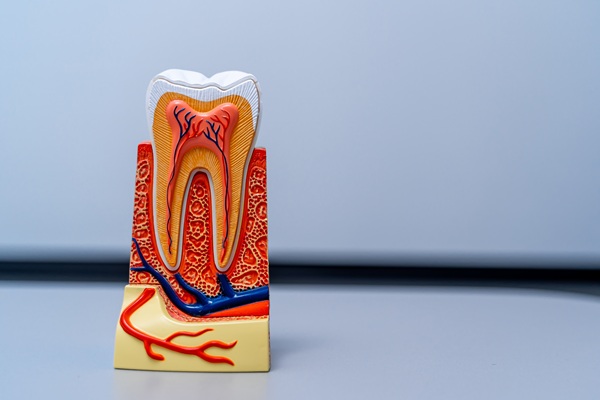When a Dentist May Refer a Patient to an Endodontist

A general dentist can perform basic tasks in tooth care, such as X-rays, oral examinations, filling cavities, and extractions. However, patients may be referred to an endodontist for more complex work, such as certain root canals. When is it likely for a dentist to refer a patient to this dental specialist?
What is a root canal?
While a filling can fix a minor cavity, deep cavities that reach the root system of a tooth may need to have a root canal. Without this procedure, bacteria flourish, decay increases, and an extraction can become necessary. In a root canal, all the decaying matter is removed, the root is completely cleaned of bacteria, and the tooth is capped with a protective crown.
A general dentist can perform a root canal, and it is a common procedure. However, some infected teeth, especially premolars and molars, have complex root systems. All of the canals of a tooth must be located and cleaned for the root canal to be effective. Some teeth have narrow canals that can be difficult to detect. In such cases, a dentist may refer the patient to an endodontist to ensure a thorough root canal that will protect the tooth and save it from extraction.
Why may an endodontist be recommended for a root canal?
An endodontist is a dentist who has completed an additional two to three years of training. All endodontists are dentists, but only about 3% of dentists are endodontists. These specialists are trained in diagnosing tooth pain and specialize in working on the interior of a tooth. Generally, they only perform endodontic procedures and on average do 25 root canals a week.
Training, experience, and equipment
The additional training an endodontist completes helps in finding difficult-to-locate canals in complex tooth systems. Coupled with experience, this specialist can often perform a successful root canal that a regular dentist would find difficult. Endodontists are also trained in the use of specialized equipment and techniques that aid in tricky root canals and can perform complex oral surgeries when necessary.
Following up the procedure
After a successful root canal, further treatment may be necessary to protect the tooth. A dentist may recommend a permanent filling or a crown to stabilize the structure. If the tooth has lost an excessive amount of structure, a post and crown may be performed before permanent restoration.
Teeth that have received endodontic treatment generally last a long time, often as long as a healthy tooth. The patient should not bite or chew using a tooth that has received a root canal until it has been restored by a dentist. As with any tooth, to maintain the treatment, perform good dental hygiene. Brush and floss at least twice a day and see a dentist twice a year for a checkup.
Conclusion
A dentist can perform a root canal, but in a complex case, an endodontist may be a better option. With additional training and experience, this specialist can find and clean every canal. A dentist can discuss the case with the patient and makes a referral if deemed necessary.
Request an appointment here: https://santarosaendodontics.com or call Santa Rosa Endodontics at (707) 409-1177 for an appointment in our Ukiah office.
Check out what others are saying about our services on Yelp: Endodontist in Ukiah, CA.
Recent Posts
Root canal treatment is often the first line of defense for treating teeth with compromised pulp chambers. The pulp chamber is the innermost layer of a tooth, and it stores nerves, blood vessels, and connective tissues. The chamber is sealed off from the rest of the tooth to protect it against bacteria and other irritants…
A root canal can preserve and strengthen a severely damaged or infected tooth. When seeing a root canal dentist, asking informed questions can provide clarity, ease concerns, and improve treatment outcomes. Understanding the procedure helps make the experience more comfortable and ensures you are well-prepared for each step.While each patient's situation is unique, the following…
A person might need to see an endodontist for a wide variety of problems, mainly relating to how they can save patients’ teeth. All endodontists are dentists because they have completed dental school, but they do two more years of specialized study in the techniques used to preserve a person’s dentition. So, if you are…
When a root canal fails, a root canal retreatment must happen. Getting a root canal treatment is better than a dental extraction. If an endodontist sees that your tooth still has good bone support and healthy gums under or around it, a root canal can save the tooth. A root canal is a less expensive…


